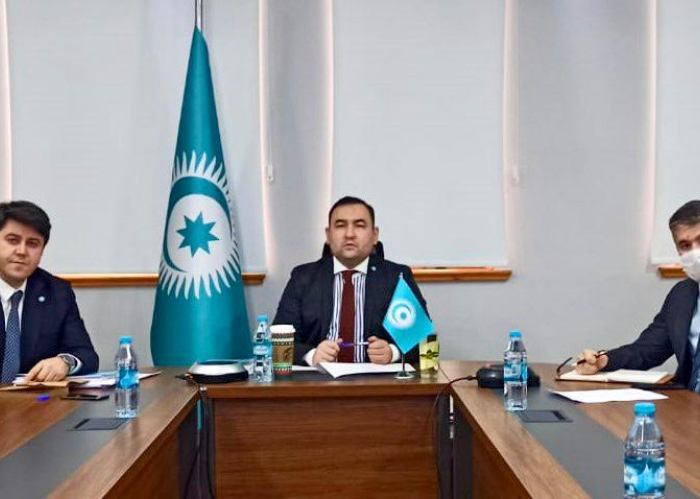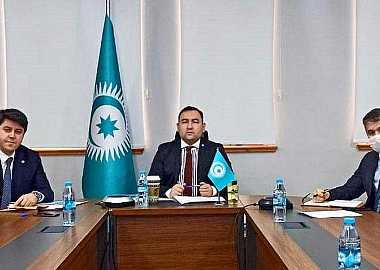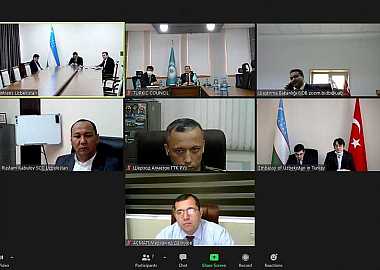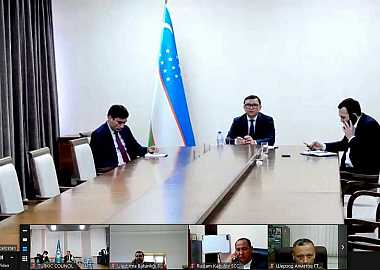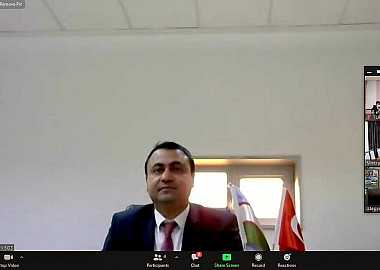The Transport Authorities of Turkey and Uzbekistan held a videoconference meeting with the support of the Turkic Council on 19 January 2021 to discuss the possibilities of digitalization of the permitting system for the international carriage of goods by road transport through introducing the ePermit Project.
It should be noted that over the past 3-4 years, the number of international carriage permit forms exchanged between Turkey and Uzbekistan increased substantially, reaching from 15 thousand to 37 thousand in 2021.
Welcoming the efforts of the Member States in implementing the ePermit Project, Deputy Secretary General of the Turkic Council Mirvokhid Azimov highlighted the importance of expansion of the project among the Member and Observer States, which will facilitate the connectivity of the Turkic countries and further deepen the existing ties between them.
During the meeting, Hasan Boz, Head of Department of Directorate General for Regulation of Transport Services, Ministry of Transport and Infrastructure of Turkey, made a presentation on the implementation of the E-Permit Project and briefed the participants on the experience of Turkey in this field as well as on the ongoing projects with the third countries.
Chief consultant of Administration of the President of the Republic of Uzbekistan Bakhtiyor Adilov underscored the importance of such initiatives and expressed the readiness of the Uzbek side to put all efforts in bringing the project to fruition within the shortest time possible.
In his turn, Director of Department of Organization of Customs Control of the State Customs Committee of Uzbekistan Rustam Kabulov proposed to explore the possibility of introducing eTIR and eCMR projects together with the Customs Authorities.
At the meeting, the Parties discussed the legal and technical aspects of the implementation of the E-Permit Project and agreed to create a joint working group to develop the modalities and IT-related details of the project.
The participants underlined that the implementation of the Project will significantly simplify the work of both Transport Authorities and cargo carriers, accelerate international transportation of goods, boost the intra-trade, economic, and transport cooperation among the Turkic states.
It should be noted that over the past 3-4 years, the number of international carriage permit forms exchanged between Turkey and Uzbekistan increased substantially, reaching from 15 thousand to 37 thousand in 2021.
Welcoming the efforts of the Member States in implementing the ePermit Project, Deputy Secretary General of the Turkic Council Mirvokhid Azimov highlighted the importance of expansion of the project among the Member and Observer States, which will facilitate the connectivity of the Turkic countries and further deepen the existing ties between them.
During the meeting, Hasan Boz, Head of Department of Directorate General for Regulation of Transport Services, Ministry of Transport and Infrastructure of Turkey, made a presentation on the implementation of the E-Permit Project and briefed the participants on the experience of Turkey in this field as well as on the ongoing projects with the third countries.
Chief consultant of Administration of the President of the Republic of Uzbekistan Bakhtiyor Adilov underscored the importance of such initiatives and expressed the readiness of the Uzbek side to put all efforts in bringing the project to fruition within the shortest time possible.
In his turn, Director of Department of Organization of Customs Control of the State Customs Committee of Uzbekistan Rustam Kabulov proposed to explore the possibility of introducing eTIR and eCMR projects together with the Customs Authorities.
At the meeting, the Parties discussed the legal and technical aspects of the implementation of the E-Permit Project and agreed to create a joint working group to develop the modalities and IT-related details of the project.
The participants underlined that the implementation of the Project will significantly simplify the work of both Transport Authorities and cargo carriers, accelerate international transportation of goods, boost the intra-trade, economic, and transport cooperation among the Turkic states.


